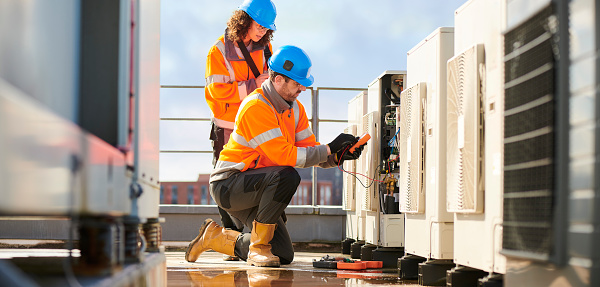
When it comes to your HVAC, safety should be the number one priority. While we all want and deserve a comfortable home, we don’t all have the training and equipment to make sure our system is doing its job properly. There are dangers lurking in the inner workings that can make attempting a repair on your own not worth the risk.
There are four main problems that can lead to failure: lack of HVAC maintenance, wear and tear, dirty filters, and water damage or leakage. If your system stops working effectively or efficiently, you might be tempted to take a look at it for yourself. Well, don’t! The HVAC industry is relatively dangerous, so let’s go over the most important safety tips you need to know to stay safe around your HVAC system as a homeowner.
1. Place a Carbon Monoxide Detector Near Your Furnace
When operating a heating system that hasn’t been well-maintained, it’s possible for carbon monoxide to make its way into the air around it. In order to avoid getting poisoned, a carbon monoxide detector can be a crucial element to have around your main system to let you know of high levels caused by leaks. Carbon monoxide is odorless and colorless, so without a detector close by, it can be almost impossible to catch before it becomes a serious problem.
Needless to say, you shouldn’t be messing around with your furnace yourself! Avoid any risk of carbon monoxide poisoning by leaving the work to our professionals. The HVAC experts at Madsen are highly-trained technicians who have your needs for heating repairs covered.
2. Turn Off the Power Before Cleaning an AC Unit
While electrical issues and cooling repairs should always be handled by an experienced technician, you may want to clean your AC unit from debris once in a while between routine maintenance visits. That’s perfectly safe to do, as long as you turn off the power beforehand. If your AC has electricity running through it while you’re cleaning the outdoor unit or dusting off evaporator coils, you could put yourself in a potentially very dangerous situation. Hit the power switch before cleaning your AC unit, and getting the cooler air flowing should be a breeze.
3. Practice Simple Ladder Safety Rules
Even if you’re just going to change your filter, basic HVAC home maintenance tasks can become perilous if conducted incorrectly — especially if you have to use a ladder to access your unit or ducts. According to a CDC report, thousands of people in the U.S. are injured due to ladder-related falls every year. By paying attention to ladder safety rules, you can make your filter change far safer in a matter of minutes.
When setting up, keep the base of the ladder a quarter of its working length from the building you’re working on and use the three-point contact rule with both hands and one foot or two feet and one hand at all times. When it comes to extension or straight ladders, extend them at least three feet above the support point and make sure all locks are engaged before use. Whether you’re cleaning your HVAC or changing a light bulb, these simple tips are helpful for making any household ladder use a lot safer.
4. Avoid Potential Hazards by Refraining from DIY Repairs
When it comes down to it, leaving repairs to the professionals is the most important safety tip we can share. If you don’t know what you’re doing, there are several ways to get hurt or make things worse. For example, if you don’t know how to test the circuit with a meter before working on your system, electrical hazards can be extremely common. Chemical exposure could also occur if you don’t have the right training or equipment to handle the job carefully and protect yourself. Using the wrong tools or working in a space with inadequate airflow can have serious implications to your health.
When it comes down to it, extensive training and high-end equipment are necessary when it comes to repairing your system properly and making sure you and your family stay safe.
Staying safe when it comes to HVAC maintenance means leaving repairs to the capable hands of technicians that work with your best interests in mind. And you can rely on the experienced professionals and state-of-the-art equipment here at Madsen. Contact our team to get your HVAC system back up and running while keeping your and your loved ones safe.


